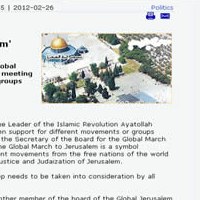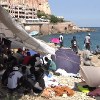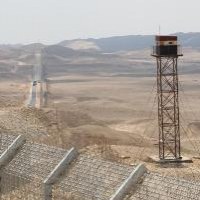![]()
Wednesday, July 29, 2015
This study is originally published by The Meir Amit Intelligence and Terrorism Information Center. The study is structured in four sections, which if read in conjunction with each other, draws a complete picture of the role of Palestinian activists and networks in Judea, Samaria and the Gaza Strip in the global BDS campaign.
BDS is short for Boycott, Divestment and Sanctions. BDS is a global anti-Israeli campaign calling for the boycott of the State of Israel. It is an integral part of the delegitimization campaign being waged against Israel, primarily in the West. The objective of the BDS campaign is to label Israel an “apartheid state” and promote an international boycott of the country and its institutions, leaders, economy and culture, as well as of Israel’s supporters. Its ultimate goal is to eventually cause Israel to wither and collapse, like the apartheid regime in South Africa. The campaign is waged by anti-Israeli activists and networks around the globe, mainly (but not exclusively) by extremist far-left and Islamic fringe groups.
The efforts of Israel’s enemies to undermine and subvert its legitimacy in the international arena are not new and have accompanied the state since its founding. The current delegitimization campaign, which the BDS campaign is an integral past, originated with the first Durban Conference, in South Africa. Officially called the World Conference against Racism, it was held in Durban, from August 31 to September 8, 2001. During the conference a forum of NGOs met to protest racism, racial discrimination, xenophobia and intolerance. In its final declaration the forum called “upon the international community to impose a policy of complete and total isolation of Israel as an apartheid state…which means the imposition of mandatory and comprehensive sanctions and embargoes, the full cessation of all links…between all states and Israel”[2].
Since the Durban Conference activists and NGOs around the globe, led by extremist, fringe far-left and Islamic networks, have endeavored to label Israel an “apartheid state” and have it boycotted politically, economically and culturally. Most of the activists and networks participating in BDS regard the campaign as a means to cause Israel to collapse, even if that is not elaborated. In several instances they have been joined by individuals who see the campaign as a way to pressure Israel into making fundamental changes in its policies towards the Palestinians. They collaborate with BDS even though they do not reject the two-state concept, and they oppose (or are unaware of) the campaign’s hidden goals. In ITIC assessment, those individuals do not currently have much influence, but they are an important target audience for BDS activists. That is because it is in their interest to include such individuals in the campaign, making it more effective, changing it from a fringe political and civil issue to a central one.
Like other networks participating in the campaign to delegitimize Israel, the BDS campaign has adopted the terminology of human rights discourse and international jurisprudence. Thus it camouflages itself as a human rights organization working to promote “freedom, justice and equality” and to restore the “Palestinians’ rights.” Its slogans hide the BDS’s genuine political objective, which is to destroy the State of Israel by isolating and boycotting it until it withers and collapses. BDS uses human rights slogans to influence Western public opinion, mainly targeting mainstream organizations and figures opposing the destruction of Israel and supporting the concept of two states for two peoples. The BDS campaign’s target audiences in the West are mainly students and academic professionals, human rights organizations, trade unions, minority groups and even Jews.
As opposed to the BDS campaign’s vague official language, the statements of many of its senior activists repeatedly show that they reject the fundamental legitimacy and existence of the State of Israel and regard the BDS campaign as a tool for undermining Israel as a democratic Jewish state. For example, the campaign strongly promotes the so-called “right of return” of the 1948 Palestinian refugees to the territory of the State of Israel and defines Israel as “a racist, colonialist state,” established through the sin of the so-called “ethnic cleansing” of the Palestinians. They promote the campaign by equating the boycott of South Africa with the boycott of Israel, and make the false analogy between the apartheid regime in South Africa and the democratic State of Israel. In their opinion, promoting a strategy of ostracism and boycotts will, in the end, lead to the collapse of the State of Israel, as it led to the collapse of the apartheid regime in South Africa.
The BDS campaign often boasts of its successes, but so far it has failed to significantly enlist countries and prominent mainstream figures. The campaign has not done much economic or cultural damage to the State of Israel. Most of its influence has been political and to a certain extent has affected Israel’s image. That is because delegitimizing Israel and labeling it an “apartheid state,” which in the past was confined to far-left and Islamic fringe groups, has seeped into Western public and political discourse. It has also occasionally been given a platform by leading Western media, such as The New York Times and Le Monde. In addition, BDS’s so-called “successes” have been widely reported by the Israeli media. The Israeli political leadership has responded to the campaign in harsh terms. The exaggerated responses in Israel have been exploited by BDS propaganda to “prove” the campaign’s successes and show it is far more effective than it is in reality.[3]
![]()
The Contents of the Report
You can find the Introduction: Main findings and other sections here:
- Introduction: Main Findings. (Read here)
- Section Two: The BNC — Palestinian Umbrella Network Collaborating with the Global BDS Campaign. (Read here)
- Section Three: Profiles of the Main Palestinian BNC Activists. (Read here)
- Section Four: Comparison of PA and BDS Campaign Positions. (Read here)
![]()
Notes:
[3] For example, Roger Waters, who was a member of Pink Floyd, became a BDS supporter. Interviewed by Gideon Levy, a journalist working for the Israeli daily newspaper Haaretz, he discussed the Israeli prime minister’s speech at the AIPAC Conference. Waters said [ITIC translation] that “[Netanyahu] said the word ‘BDS’ no less than seventeen times. Last year no one mentioned BDS at all anywhere. That is a tremendous change.” Abraham Foxman, National Director of the Anti-Defamation League, was interviewed by the popular daily Israeli newspaper Yedioth Aharonot (July 24, 2015) on the occasion of his retirement. He said the following [ITIC translation and emphasis throughout]: “I was in college in the sixties, and believe be, it was no picnic to be pro-Israel. Fifty years later we have problems with the same schools. But this is what drives me nuts: there are 4,000 universities in the United States, and the mess is in 25 or 30 of them. I don’t understand why we are blowing all this up into an existential crisis. Why give them a victory when they aren’t even winning? No university participates in the boycott…You know how many Israeli ministers there are dealing with the BDS? What for? It’s not an issue to go to war over. We are turning the movement into something much bigger than it really is. Obviously, it is important to remain aware. But we have to deal with it with a scalpel, not a tank. Unfortunately, I am in the minority here. What I mean is, I would be happy if we were a little less smart.”



 RSS
RSS












[…] Section One: The BDS Campaign and Its Roots. (Read here) […]
[…] Section One: The BDS Campaign and Its Roots. (Read here) […]
[…] Section One: The BDS Campaign and Its Roots. (Read here) […]